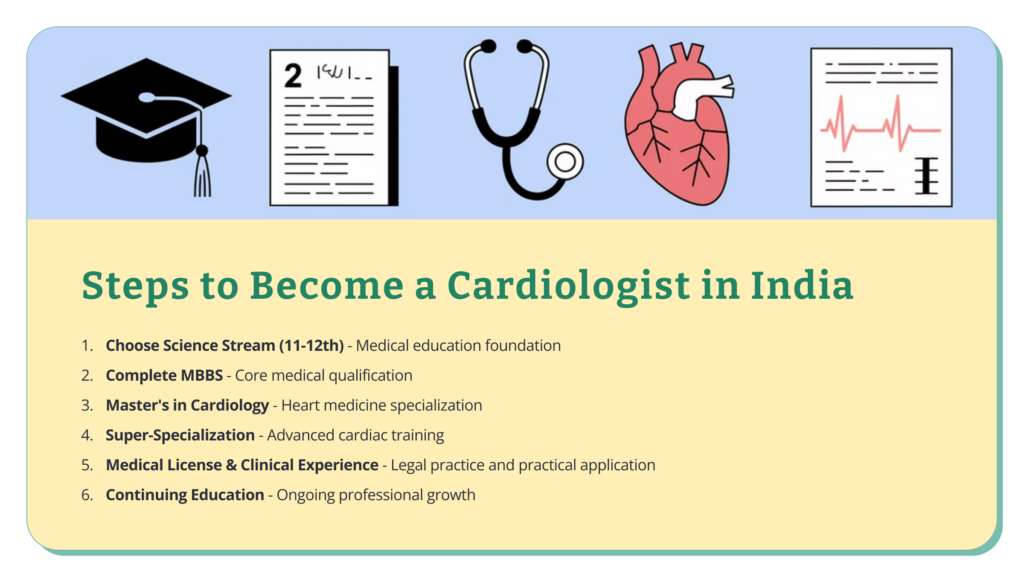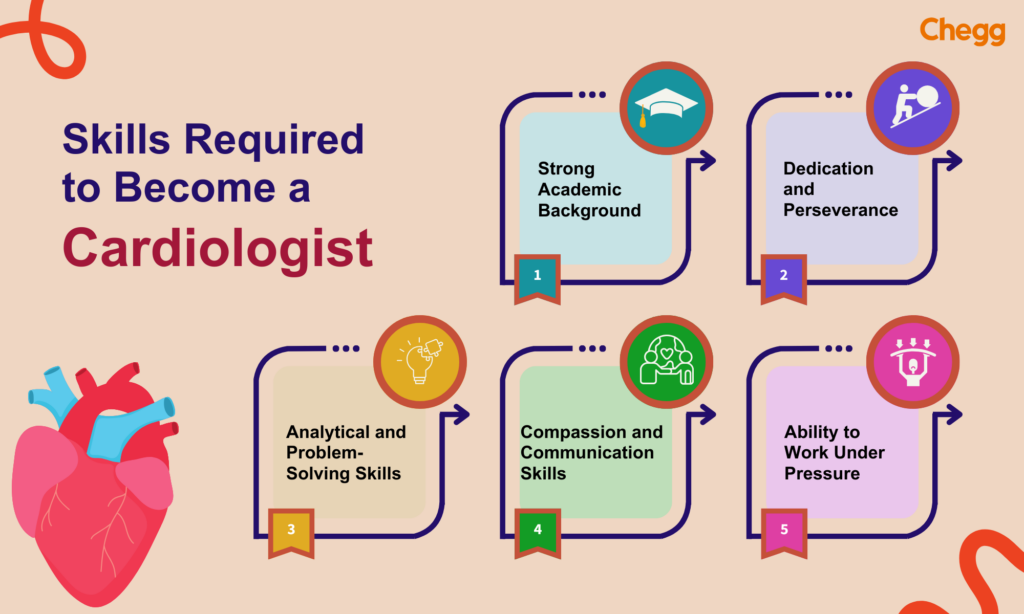
Got a question on this topic?

Quick Summary
Table of Contents

Authored by, Amay Mathur | Senior Editor




Amay Mathur is a business news reporter at Chegg.com. He previously worked for PCMag, Business Insider, The Messenger, and ZDNET as a reporter and copyeditor. His areas of coverage encompass tech, business, strategy, finance, and even space. He is a Columbia University graduate.
How to become a cardiologist involves gaining expertise in cardiology, a specialized branch of medicine focused on diagnosing and treating heart-related conditions. Cardiologists play a crucial role in maintaining cardiovascular health by preventing and managing heart diseases. Their work requires a deep understanding of medical science, strong diagnostic skills, and advanced treatment techniques to improve patients’ overall well-being.
To understand how to become a cardiologist, one must start with a solid academic foundation in medical sciences. The journey begins with completing an MBBS degree, followed by a postgraduate specialization in internal medicine or pediatrics. After that, aspirants must pursue a super-specialization in cardiology, such as a DM or DNB in Cardiology. This rigorous training ensures that cardiologists acquire the necessary expertise to handle complex heart conditions.
For those wondering how to become a cardiologist in India, dedication and passion for cardiology are essential. In addition to completing the required qualifications, aspiring cardiologists must develop strong analytical skills, attention to detail, and the ability to work under pressure. By mastering these skills and gaining hands-on experience, they can establish themselves in this rewarding field and make significant contributions to heart health.

Know how to become a cardiologist after the 12th by following a structured path. Start by choosing the Science stream with Biology in 11th and 12th. Then, complete an MBBS degree, followed by a postgraduate degree in Cardiology. Gaining practical experience, obtaining a medical license, and pursuing super-specialization will help you succeed. Understanding how to become a cardiologist requires dedication, hard work, and continuous learning in the medical field.
The first step in how to become a cardiologist starts with selecting the Science stream in your 11th and 12th standard. You must study Physics, Chemistry, and Biology (PCB) as your main subjects, as they form the foundation for your medical career.
To secure admission to a medical college, you must also prepare for and clear the NEET-UG exam. Scoring well in this highly competitive entrance exam is crucial for pursuing an MBBS degree.
While pursuing the Science stream, aspiring cardiologists should develop the following essential skills:
The second step in how to become a cardiologist is enrolling in an MBBS program after successfully passing the NEET-UG exam. MBBS (Bachelor of Medicine and Bachelor of Surgery) is a five-and-a-half-year course, including one year of internship in a hospital setting.
During the MBBS course, students study various medical subjects such as:
Practical training during MBBS is crucial as it helps students learn how to diagnose and treat patients under the guidance of experienced doctors. After completing MBBS, students can move forward in their journey to specialize in cardiology.
After MBBS, the next step in how to become a cardiologist is pursuing a postgraduate degree (MD or DNB in General Medicine) followed by a DM (Doctorate of Medicine) in Cardiology. This postgraduate specialization in cardiology provides in-depth knowledge about:
This three-year program helps aspiring cardiologists gain theoretical and practical expertise in heart diseases and treatments.
For those looking for advanced training, the next step in how to become a cardiologist is enrolling in a super-specialization course. This advanced course (DM or DNB in Cardiology) lasts two years and focuses on:
A super-specialization degree makes cardiologists highly skilled and prepares them for handling complex heart-related cases.
To practice as a cardiologist in India, obtaining a medical license is mandatory. The Medical Council of India (MCI) issues licenses to qualified doctors.
Steps to Get a Medical License –
This step is a crucial part of how to become a cardiologist, as it ensures that all practicing doctors meet the required medical standards.
Once you have obtained your medical license, the next step in how to become a cardiologist is gaining practical experience. Aspiring cardiologists can work in:
Working under senior cardiologists helps in learning the latest medical advancements and refining treatment techniques. During this period, cardiologists gain experience in performing surgeries, treating patients, and handling emergencies.
A cardiologist’s learning never stops. To stay updated with the latest advancements, continuous professional development is essential in how to become a cardiologist. This includes:
Engaging in professional development activities helps cardiologists enhance their skills and provide the best medical care to their patients.

To practice as a cardiologist in India, candidates must complete two key postgraduate degrees after earning an MBBS:
The first step toward specialization in cardiology is obtaining a Doctor of Medicine (MD) in General Medicine. This degree provides a strong foundation in medical sciences and prepares candidates for advanced studies in cardiology.
During this program, students gain both theoretical knowledge and practical experience through hospital rotations, patient interactions, and case studies.
After completing an MD in General Medicine, candidates must pursue a Doctorate of Medicine (DM) in Cardiology, which focuses on advanced topics in heart diseases and treatment methods.
This super-specialization provides extensive clinical training and research opportunities in cardiology.
Understanding how to become a cardiologist also involves knowing the time commitment required. The journey from high school to becoming a certified cardiologist takes approximately 11.5 years after completing 12th grade with the Science stream.
The first step is obtaining an MBBS degree, which takes 5.5 years to complete, including one year of mandatory internship.
After MBBS, the next step is pursuing an MD in General Medicine, which requires 3 years of study and practical training.
To specialize further, candidates must complete a DM in Cardiology, which takes another 3 years.
This timeline includes undergraduate education, postgraduate specialization, and super-specialization, ensuring that cardiologists receive comprehensive training before beginning their professional practice.
The salary of a cardiologist in India is influenced by factors like experience, location, type of healthcare facility, and qualifications. On average, a cardiologist in India earns around INR 1,813,220 annually, according to PayScale. However, this can vary based on several variables.
Cardiologists’ salaries tend to rise with experience. Here’s a breakdown of average annual earnings based on experience:
The region in which a cardiologist practices also impacts their salary. For instance, those working in metropolitan cities tend to earn more compared to those in smaller towns. Here are the average salaries in some major cities:
Know how to become a cardiologist by developing essential skills. Becoming a successful cardiologist in India requires more than just earning degrees and licenses. Strong analytical skills, problem-solving abilities, compassion, and good communication are key. The ability to work under pressure and stay updated with medical advancements is also important. To truly understand how to become a cardiologist, one must focus on both medical expertise and patient care.

To understand how to become a cardiologist, having a strong academic background is very important. It starts with choosing the Science stream in 11th and 12th grades, focusing on subjects like Biology, Chemistry, and Physics. After that, completing an MBBS degree is necessary. Since cardiology is a specialized field, further studies like a postgraduate degree (MD in Medicine) and a super-specialization (DM in Cardiology) help gain expertise. Learning never stops in this field, as new advancements keep coming. Those who want to know how to become a cardiologist must be prepared for years of study and training.
The journey to becoming a cardiologist is long and requires a lot of hard work. To understand how to become a cardiologist, one must be ready for years of education, practical training, and hands-on experience. It takes dedication and patience to study medicine, complete specializations, and gain expertise in heart-related treatments. Cardiologists deal with complex cases, so they need to stay strong and focused. Even after getting a degree, doctors must continue learning to keep up with new medical developments.
To become a good cardiologist, strong analytical and problem-solving skills are essential. Understanding how to become a cardiologist includes learning how to diagnose heart conditions, read test results, and decide the best treatment for patients. Since every patient is different, cardiologists must think carefully and make quick decisions. Identifying heart diseases early can save lives, so having sharp problem-solving skills is crucial. This ability improves with experience, practice, and continuous learning.
Cardiologists must have compassion and empathy toward their patients. Understanding how to become a cardiologist is not just about medical knowledge; it is also about dealing with people. Patients with heart conditions often feel anxious, and a cardiologist should know how to comfort and support them. Good communication skills are important to explain medical conditions and treatment options clearly. A kind and caring approach helps patients trust their doctor and follow medical advice properly.
Cardiologists often work in high-pressure situations, such as emergency rooms and intensive care units. Learning how to become a cardiology doctor also means learning how to stay calm in stressful situations. Heart-related cases can be life-threatening, and quick decisions are required. A cardiologist must handle emergencies while staying focused and confident. The ability to manage stress and think clearly under pressure is essential for success in this field.
In conclusion, understanding how to become a cardiologist involves years of education, dedication, and skill-building. This career demands strong academic knowledge, problem-solving abilities, communication skills, and the ability to work under pressure. Those who choose this path must be ready for challenges, but it is a highly rewarding profession that allows hepatologist doctor to save lives and heart doctor improve heart health.
India has some of the best institutes for cardiology, ranked among the top in the country. These institutes offer excellent education, training, and research opportunities for aspiring cardiologists, helping them build a strong career in the medical field.
| College | NIRF Ranking |
| AIIMS, New Delhi | 1 |
| PGIMER, Chandigarh | 2 |
| CMC Vellore | 3 |
| SGPGIMS, Lucknow | 4 |
| BHU, Varanasi | 5 |
Here are the career opportunities and salaries for a cardiologist in India. If you’re wondering how to become a cardiologist, the journey typically involves completing an MBBS degree, followed by a specialization in cardiology through MD or DM programs. Cardiologists can work in hospitals, private clinics, research institutions, and medical colleges. They can also specialize in areas like interventional cardiology or pediatric cardiology. Salaries vary based on experience, location, and expertise. A beginner earns around ₹10-15 lakh per year, while experienced cardiologists can earn over ₹50 lakh annually. The field offers excellent growth and stability.
Cardiologists in India have diverse career opportunities in both government and private hospitals. They can also work in research institutions and medical colleges. If you’re wondering how to become a cardiologist, the path involves completing an MBBS degree, followed by an MD in General Medicine and a DM in Cardiology. Many cardiologists choose to specialize in areas like interventional or pediatric cardiology. Opportunities also exist in healthcare administration and private practice. With the growing demand for heart specialists, the field offers stability, career growth, and rewarding financial prospects for qualified professionals.
| Job opportunities in government hospitals | Job opportunities in private hospitals |
| Consultants | Senior Consultant |
| Medical officers | Department head |
| Professors in medical colleges | Director |
Cardiologists can explore careers in research and academia by working in universities, research institutions, and pharmaceutical companies. Understanding how to become a cardiologist also involves contributing to medical advancements through research. With the growing demand for healthcare services in India, cardiologists play a crucial role in developing new treatments and improving patient care. Research helps in finding better ways to prevent, diagnose, and treat heart diseases effectively.
They can work in –
The demand for healthcare services in India is increasing. As a result, cardiologists play a vital role in conducting research and developing new treatments. Their efforts help improve patient care, advance medical technology, and enhance heart disease prevention and treatment.
The salary of a cardiologist in India depends on factors like experience, skills, and location. On average, cardiologists earn around INR 13.2 lakhs per year. With more experience and expertise, their earnings can increase significantly, especially in top hospitals and private practice.
A cardiologist’s responsibilities vary based on their expertise and experience. Their key duties include:
In conclusion, understanding how to become a cardiologist requires dedication, rigorous training, and continuous learning. The journey involves completing an MBBS degree, pursuing a master’s specialization in cardiology, and gaining hands-on experience in hospitals or clinics. With advancements in medical science, cardiologists must stay updated with new techniques and treatments to provide the best care for patients.
The demand for cardiologists is increasing, making this a promising career choice. Those who follow the steps of how to become a cardiologist can work in top hospitals, research institutions, and private clinics. While the path is challenging, the rewards are significant, both professionally and financially. For those passionate about heart health, learning how to become a cardiologist can lead to a fulfilling and impactful career.
Evaluate numerous career choices to choose the right career path for yourself. Dive into our guide on Career Advice.
The youngest age to become a cardiologist in India is around 26-27 years, typically after completing the necessary education: 12th grade (Science stream), MBBS (5.5 years), MD in General Medicine (3 years), and DM in Cardiology (3 years). If you’re wondering how to become a cardiologist, the journey involves rigorous medical training, specialization in cardiology, and hands-on clinical experience.
Yes, cardiologists need to clear NEET at different stages: NEET-UG for MBBS, NEET-PG for MD in General Medicine, and NEET-SS for DM in Cardiology.
Becoming a cardiologist in India takes approximately 11.5 years after completing the 12th grade. Here’s the breakdown:
a) MBBS – 5.5 years (including a 1-year internship)
b) MD in General Medicine – 3 years
c) DM in Cardiology – 3 years
So, the total duration is around 11.5 years to become a cardiologist.
MD in General Medicine is a broad medical degree, while DM in Cardiology is a super-specialization in heart care, pursued after MD.
Yes, an MBBS degree is the foundational medical degree required before one can specialize in cardiology or any other medical specialty. If you’re wondering how to become a cardiologist, the journey typically involves completing an MBBS, followed by an MD in Internal Medicine, and then a super-specialization in DM Cardiology.
Editor's Recommendations
Chegg India does not ask for money to offer any opportunity with the company. We request you to be vigilant before sharing your personal and financial information with any third party. Beware of fraudulent activities claiming affiliation with our company and promising monetary rewards or benefits. Chegg India shall not be responsible for any losses resulting from such activities.
Chegg India does not ask for money to offer any opportunity with the company. We request you to be vigilant before sharing your personal and financial information with any third party. Beware of fraudulent activities claiming affiliation with our company and promising monetary rewards or benefits. Chegg India shall not be responsible for any losses resulting from such activities.